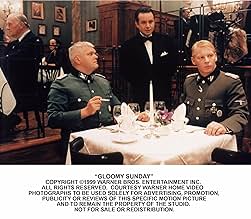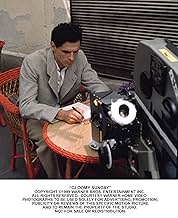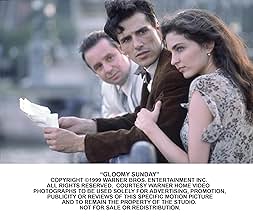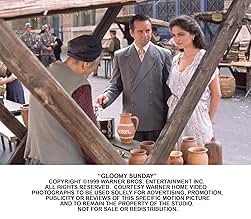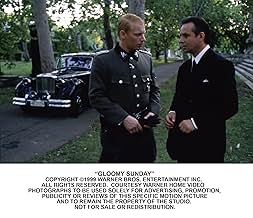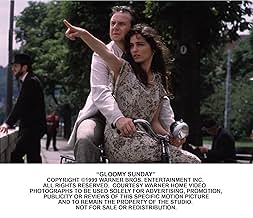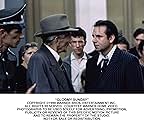PUNTUACIÓN EN IMDb
7,8/10
8,7 mil
TU PUNTUACIÓN
Añade un argumento en tu idiomaFollows three men who are in love with a beautiful waitress during World War II: an intellectual restaurant owner, a mysterious musician, and an erratic businessman.Follows three men who are in love with a beautiful waitress during World War II: an intellectual restaurant owner, a mysterious musician, and an erratic businessman.Follows three men who are in love with a beautiful waitress during World War II: an intellectual restaurant owner, a mysterious musician, and an erratic businessman.
- Dirección
- Guión
- Reparto principal
- Premios
- 7 premios y 5 nominaciones en total
Reseñas destacadas
The late 90s through the early 00s were a breeding ground for urban legends, as we saw in Magnolia (1999), Darwin Awards (2006) and of course the Urban Legends film & TV franchise spanning the decade. Maybe it's due to the fact that the internet, with its viral sensationalism, had just become popular while fact-checking resources had not yet caught up. This made for some very creative storytelling at the expense of truth. But heck, isn't that what storytelling is all about.
Here we have "Gloomy Sunday" (1999) an intriguing story woven around the titular song which, as urban legend has it, caused or accompanied some 20 suicides (exaggerated to "hundreds" in the film). In reality, the song has never been credibly linked to any suicides except that a lot of people in Hungary killed themselves in the 30s when the song was recorded. But I dunno, maybe Hungary's Great Depression had a little more of a role in that statistic?
Enough history. The rest of my review approaches this film as a pure work of fiction, and it's a pretty good one. It's not simply a 2-dimensional message like "sad songs kill people" but it cuts more to the root of what suicide is, the complexity of what motivates it (not just having a sucky life, otherwise a lot more of us would be at the bottom of San Francisco Bay), and how music, art, love and war resonate with the concept of killing oneself.
The story revolves around a love rectangle between the song's composer (a piano player in a restaurant), a waitress, the restaurant owner and a regular diner in the resaurant. But it's no ordinary "jealous lover" type of cliché. Rather, the theme of love, just like the theme of death, is that it is a personal choice that cannot be subjected to society's morals or rules. In other words, the lovers place no conventional expectations on each other (though fury & resentment does play into it). Immediately it strikes you as a love story worth paying attention to.
Next comes the theme of war, particularly World War II and the Nazi persecution of Jewish people. This adds tremendous spice, depth and peril to the situation. It's handled in a subtle yet chilling way that reminds me of the excellent Benigni film around the same time "Life Is Beautiful".
Last but certainly not least is the story's climax and resolution which, itself is worth the price of admission. Let's just say I did not see it coming. And when a film can do that (without being ridiculous) I'm always impressed. I can't imagine anyone who wouldn't be.
The music itself is nice, if you like the song "Gloomy Sunday", but if I were to nitpick, I have to say I didn't like the Heather Nova cover of the song at the closing credits because it featured the "updated" lyrics that were added to the English version in 1936 to make it less depressing (I'm talking about the "dreaming, I was only dreaming" part). I know Billie Holiday popularized that amendment in her famous version, but Billie is allowed to do whatever she damn wants!
Bottom line: great story, great production, great acting & cinematography. But, as with the excellent film "Amadeus", don't expect to study for your musical history exam by watching it. This is creative storytelling at its best.
Here we have "Gloomy Sunday" (1999) an intriguing story woven around the titular song which, as urban legend has it, caused or accompanied some 20 suicides (exaggerated to "hundreds" in the film). In reality, the song has never been credibly linked to any suicides except that a lot of people in Hungary killed themselves in the 30s when the song was recorded. But I dunno, maybe Hungary's Great Depression had a little more of a role in that statistic?
Enough history. The rest of my review approaches this film as a pure work of fiction, and it's a pretty good one. It's not simply a 2-dimensional message like "sad songs kill people" but it cuts more to the root of what suicide is, the complexity of what motivates it (not just having a sucky life, otherwise a lot more of us would be at the bottom of San Francisco Bay), and how music, art, love and war resonate with the concept of killing oneself.
The story revolves around a love rectangle between the song's composer (a piano player in a restaurant), a waitress, the restaurant owner and a regular diner in the resaurant. But it's no ordinary "jealous lover" type of cliché. Rather, the theme of love, just like the theme of death, is that it is a personal choice that cannot be subjected to society's morals or rules. In other words, the lovers place no conventional expectations on each other (though fury & resentment does play into it). Immediately it strikes you as a love story worth paying attention to.
Next comes the theme of war, particularly World War II and the Nazi persecution of Jewish people. This adds tremendous spice, depth and peril to the situation. It's handled in a subtle yet chilling way that reminds me of the excellent Benigni film around the same time "Life Is Beautiful".
Last but certainly not least is the story's climax and resolution which, itself is worth the price of admission. Let's just say I did not see it coming. And when a film can do that (without being ridiculous) I'm always impressed. I can't imagine anyone who wouldn't be.
The music itself is nice, if you like the song "Gloomy Sunday", but if I were to nitpick, I have to say I didn't like the Heather Nova cover of the song at the closing credits because it featured the "updated" lyrics that were added to the English version in 1936 to make it less depressing (I'm talking about the "dreaming, I was only dreaming" part). I know Billie Holiday popularized that amendment in her famous version, but Billie is allowed to do whatever she damn wants!
Bottom line: great story, great production, great acting & cinematography. But, as with the excellent film "Amadeus", don't expect to study for your musical history exam by watching it. This is creative storytelling at its best.
...on why this film is doing well in communities unafraid to see subtitled films. For one thing, the beginning and ending create and resolve a compelling mystery (most of the film is a flashback). For another, you may or may not believe that a song could drive people to suicide, but you must admit it is a beautiful, sad and haunting melody. The story held my interest, as did the characters. The other obvious appeal was the opportunity to gaze endlessly at the incredibly lovely and angelic Erika Marozsán. I am female and straight and I could not get enough of looking at her; I could easily believe that she might inspire a piece of music that conveyed its composer's hopeless longing for her. (And he wasn't so hard to look at himself!) The only thing I couldn't figure out about Mr. Simpson's comments was what the film had to do with New Zealand. Now I know: nothing! :-)
According to the Los Angeles Times review of this film, "The song was actually composed in 1935 by Rezsö Seress, with lyrics by László Jávor, and did in fact accompany a number of suicides as Europe grew darker; Billie Holliday recorded a popular American version." So I guess it's not so far-fetched after all! Who knew?
According to the Los Angeles Times review of this film, "The song was actually composed in 1935 by Rezsö Seress, with lyrics by László Jávor, and did in fact accompany a number of suicides as Europe grew darker; Billie Holliday recorded a popular American version." So I guess it's not so far-fetched after all! Who knew?
This film is about the life of a woman, who got caught between 2 lovers against a backdrop of the turbulent times of the Holocaust.
Words cannot describe how beautiful and powerful this film is. Everything is excellent. The sets are beautiful, and the scenes are beautifully composed. Ilona is great as the lady which every men would fall in love with. She has this graceful elegance which is very magnetic. Laszlo's work as the restaurant owner is convincing, he has every detail of the restaurant under control. The music is great. When I listened to the song "Gloomy Sunday', I felt this chill spreading through my body, as if I was going to be the next victim. Another highlight for me is the uptight secretary who lives by the book, which is clearly a satire about the German culture. The plot is highly touching and powerful, and I do urge everyone to see this beautiful film.
Words cannot describe how beautiful and powerful this film is. Everything is excellent. The sets are beautiful, and the scenes are beautifully composed. Ilona is great as the lady which every men would fall in love with. She has this graceful elegance which is very magnetic. Laszlo's work as the restaurant owner is convincing, he has every detail of the restaurant under control. The music is great. When I listened to the song "Gloomy Sunday', I felt this chill spreading through my body, as if I was going to be the next victim. Another highlight for me is the uptight secretary who lives by the book, which is clearly a satire about the German culture. The plot is highly touching and powerful, and I do urge everyone to see this beautiful film.
I did not necessarily expect this to be a real good movie. Stories taking place during the Nazi regime and WW2, especially when made by Germans, sometimes tend to be ultra-politically-correct. But, surprise, surprise. Rolf Schübel's first feature (he did documentaries before) uses backdrop of Nazi-occupied Budapest to deliver a meaningful "menage-a-quatre", wrapped in a free interpretation of creation of famous suicide hymn "Gloomy Sunday". Fine acting all over the place, especially by Krol and Becker (still brave in German moviemaking to show a Nazi not as a complete monster, even if he is, after all, the bad guy), and despite the overall sad story executed surprisingly lighthanded. Drama, a touch of humor, some suspense and even some sex (however, the latter seems to be unnecessary sometimes - it would have worked without or with less). Not to be forgotten: excellent soundtrack album, including several versions of "Gloomy Sunday". Definitely one of the best German movies of 1999.
I wrote this review in December of 2012 when the movie was titled "Gloomy Sunday." A great movie experience. I'm 82 (then) and had been watching movies since I was 18 months old, held in my mother's arms. This is an unforgettable film. Every facet is superb. The acting is flawless, the cinematography is breathtaking, and the gripping story has every human emotion imaginable. It's hypnotic from start to finish, but keep in mind, you have to be attentive. There are some subtle touches that can go unnoticed if you're not carefully observing and listening, and missing them can possibly deprive you of fully understanding and enjoying the fantastic ending. The skilled director doesn't use a heavy hand, and that's admirable. Every single actor gives a perfect performance. Having studied acting for five years, I must mention that they don't act, they behave. Erika Marozsán's portrayal is colossal!. I've fallen in love with her. Even if I were 18 months old now, there's a scene with Joachim Król I'd remember the rest of my life. I've viewed that particular scene about eight times. Gut-wrenching, yet inspirational. Never in my life have a watched any movie four times, and I just saw this one again for the fourth time... in one week! If not for IMDb and Netflix, I would never have heard of it. And it received no nominations for the Academy Awards. Ridiculous! This is truly a masterpiece! I'd never written a review for IMDb before this, but for this film I had to do it. I cannot praise this movie enough!
¿Sabías que...?
- CuriosidadesWieck, the Nazi played by Ben Becker, is a fictionalized SS Col. Kurt Becher, who was acquitted in Nuremberg of war crimes and who ended up the richest man in Germany.
- PifiasAt a movie theater, the trio watches a newsreel that declares that the song "Gloomy Sunday" "drove 157 people in Hungary to suicide in the past eight weeks." It's unknown whether that statement ever actually appeared in a German newsreel during the war. There is no evidence that the song ever actually drove more than a handful of people--if any--to suicide.
- ConexionesFeatured in Die Männer vom K3: Jugendliebe (1999)
- Banda sonoraSzomorú Vasárnap/Gloomy Sunday
Music by Rezsö Seress
Lyrics by László Jávor
English lyrics by Sam Lewis (as Sam M. Lewis)
Akla Musikverlag Berlin
Selecciones populares
Inicia sesión para calificar y añadir a tu lista para recibir recomendaciones personalizadas
- How long is Gloomy Sunday?Con tecnología de Alexa
Detalles
- Fecha de lanzamiento
- Países de origen
- Idiomas
- Títulos en diferentes países
- The Piano Player
- Localizaciones del rodaje
- Empresas productoras
- Ver más compañías en los créditos en IMDbPro
Taquilla
- Recaudación en Estados Unidos y Canadá
- 585.604 US$
- Fin de semana de estreno en EE. UU. y Canadá
- 7102 US$
- 22 jun 2003
- Recaudación en todo el mundo
- 646.532 US$
- Duración1 hora 52 minutos
- Color
- Mezcla de sonido
- Relación de aspecto
- 1.85 : 1
Contribuir a esta página
Sugerir un cambio o añadir el contenido que falta

Principal laguna de datos
What is the Spanish language plot outline for Gloomy Sunday (1999)?
Responde

